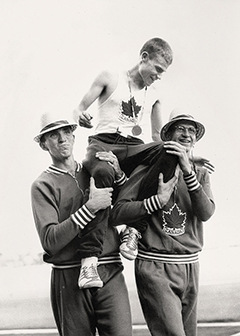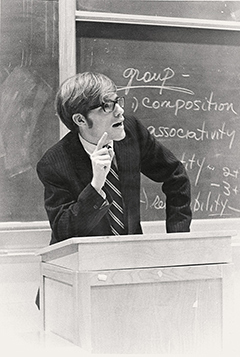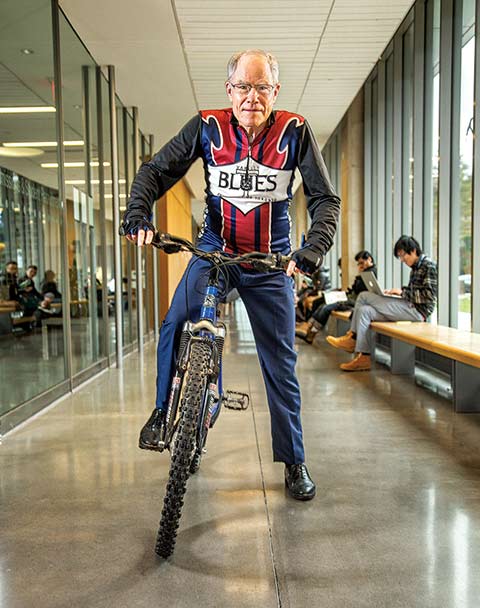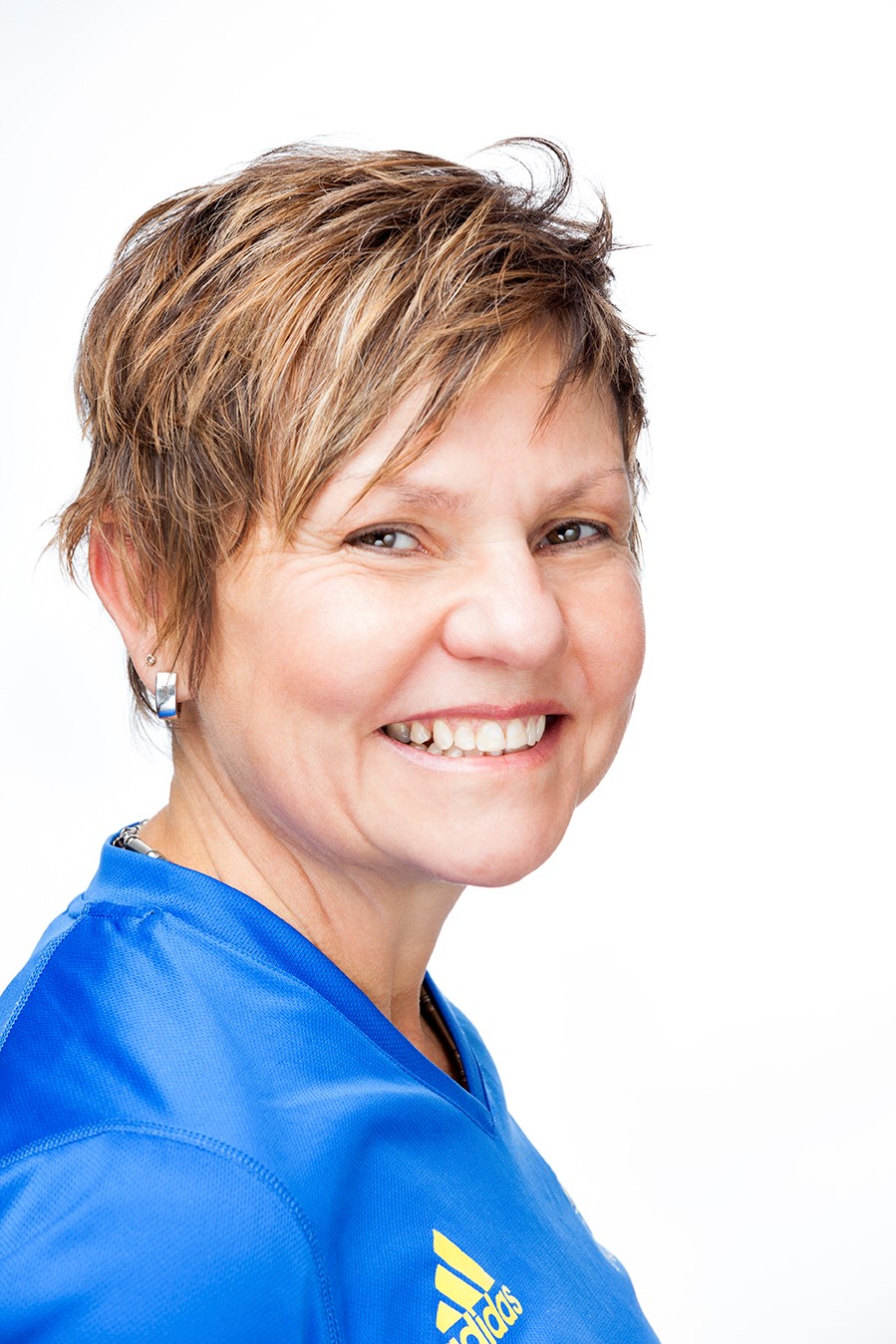Bruce Kidd had just returned from a long cross-country ski when he got the call. As he tells the story, that February day in 2014 was perfect – sunny, bracingly cold. Just recalling it, his eyes glisten with the exhilaration of gliding through snow-puffed, pine-forested trails to return to a roaring fire at the family country home, itself a repository of memory. More than a half-century ago, his pals on the U of T track team came here summer weekends to run the trails in the morning and haul cinder block to help build the place in afternoons – an anecdotal nugget for the memoir Kidd was contemplating writing, should he ever retire.
On his BlackBerry was U of T president Meric Gertler, with a big ask: Would Kidd take over as principal of U of T Scarborough? Just for the interim, Gertler nudged, until a committee could organize a formal search to replace outgoing principal Franco Vaccarino. The president nudged some more. In a little more than a year, UTSC would welcome the world to its new $205-million Toronto Pan Am Sports Centre, one of the largest single investments in amateur sport in the history of Canada. After, UTSC would claim joint ownership and use of the biggest legacy building of the 2015 Games, and rightfully so. UTSC students helped build it, by voting for a $30-million levy, responding positively as they had to two previous challenges to support major capital expansions at U of T’s eastern campus. The president knew Kidd’s prominence in high-performance sport – twice elected into the Canadian Olympic Hall of Fame, as an athlete then a builder – made him “the perfect fit” to guide UTSC into the international spotlight.
But Kidd had reason to take pause. He was about to turn 72. He had already tried to retire before, after spending nearly his entire adult life at U of T. His relationship with the university began while he was still a high school student, when he started training with U of T’s track team. He exploded onto the international running scene at 17 as the youngest competitor at a two-mile race in Boston, where he won by smashing the meet record. “Never in track history, indoors or out, has anyone so young run so far so fast,” reported Sports Illustrated. Kidd returned home a national celebrity. Although scholarship offers from American universities had been flooding in, Kidd chose U of T. Specializing in three- and five-mile distances, he won 18 national titles (including five in the U.S.); captured gold and bronze at the Commonwealth Games; competed in the 1964 Olympics; and was twice named Canada’s Male Athlete of the Year – all while juggling undergraduate classes and running for the Blue and White. Representing Canada at such a young age, he said, proved to be great leadership training. Travelling around the world also opened his eyes to inequities, here and abroad, setting the stage for his next career as human rights agitator, intellectual gadfly and community builder.

national running titles, captured two medals at the Commonwealth Games and competed in the 1964 Olympics. Photo: Faculty of Kinesiology and Physical Education Archives
After graduate school, Kidd donned the academic uniform of U of T for more than 40 years – 19 as dean of what is now the Faculty of Kinesiology and Physical Education. He used his reputation and influence to fight on behalf of those denied the opportunities his sporting career had showered on him. In the 1960s, he began protesting against sports apartheid in South Africa – and continued to do so until apartheid’s abolishment in the early 1990s. As dean, he ushered in policies to make U of T a national leader in supporting gender equity and sexual diversity in sports, and strengthened intramural and fitness programs to boost athletic opportunities for all students, not just elite athletes. Kidd played a critical role in shaping national sports policies to shore up athletes’ rights and to increase access to amateur sports. For thinking laps ahead of others on these issues, he was honoured by the United Nations and made an Officer of the Order of Canada, though he often faced searing public criticism for challenging the status quo. He retired just shy of his 67th birthday but jokes that he “flunked retirement.” Less than a year later,
Kidd was called back into service as the warden of Hart House. He didn’t have a chance to retire from that before the call came to lead UTSC.
When Kidd got off the phone, he put Gertler’s proposal to his spouse, Phyllis Berck, who had just returned from a marathon-training run. The director of the City of Toronto’s Office of Partnerships, Berck had worked early on with UTSC leaders to develop the Toronto Pan Am Sports Centre. She was unequivocal about the prospect of Kidd adding yet another chapter to his U of T career. “UTSC is full of interesting, smart, ambitious people,” she told him. “You’ll love it.”
Six months into the job, Kidd found that he loved it very much. He let his name stand in the search for an ongoing principal and, on November 20, was installed as UTSC’s 10th leader in its 51-year history. “The president asked me to do him a favour. After coming here, I felt he was doing me a favour. This is one of the most ambitious educational and social experiments I’ve ever been part of. When the opportunity came to be the ongoing principal, I wanted it.”
Watch a short 1962 documentary about Bruce Kidd
Runner by Don Owen, National Film Board of Canada
Shortly after the start of the fall term this year, Bruce Kidd invited me to tag along on official principal’s business to show me why he’s so passionate about UTSC. When he greets me on the front steps of the Arts and Administration Building, he’s wearing spandex bicycle shorts. He eschews the elevator and bounds up several flights of stairs to his fourth-floor office, which offers sweeping views of a campus he hails as “beautiful.” Situated on 120 hectares of parkland and urban forest in the Highland Creek Valley, the UTSC campus features architecture ranging in style from the Brutalist Andrews Building to the inspired-by-nature
Environmental Science and Chemistry Building, which is seeking LEED gold certification. To accommodate an expected 20 per cent growth in the current student enrolment of 13,000 by the end of the decade, the campus is planning (pending funding, of course) another round of ambitious expansion: new academic and research facilities, a student residence, a public transportation hub, and a hotel and conference centre.
As Kidd looks over the campus, he says that arriving here was like coming home. He grew up nearby on Kingston Road. As a kid, he attended a YMCA day camp located on the future grounds of UTSC. And as an undergrad track star, he logged miles of long runs on local roads.
But the homecoming has also reconnected him to his earliest understanding of what a university can achieve. His father, J. Robbins “Roby” Kidd, a world-renowned adult educator and the first chair of adult education at the Ontario Institute for Studies in Education, took the family along when he was consulting on the creation of campuses for the University of the West Indies in Barbados and Trinidad. The two islands were emerging from British colonial rule and trying to forge a path to independence. Bruce, just 14, accompanied his father to meetings and heard professors, politicians, business people and farmers articulating a vision of a university that was not for the elite but a resource for everyone, a critical tool for economic, community, cultural and social development – in short, nation-building. “I feel like I’ve come full circle because I see that kind of ambition here,” says Kidd. “UTSC is the new Canada, a campus of newcomers, ambition and innovation.”
Indeed, UTSC is more diverse than most Canadian universities. Eighty per cent of the student population identifies as non-white and 17 per cent are international students, with each incoming class representing some 80 countries. UTSC is helping strengthen an underserved community, Kidd says, and that community’s diversity strengthens UTSC in turn, fuelling innovation in programming, teaching and research. Students thrive in the international setting, becoming highly engaged in both campus and world affairs. “No matter who you are, you will see yourself reflected in the student body here. There’s a strong sense of, ‘we’re in this together’ and that leads to strong student councils, course unions, clubs and sports teams,” says Kidd. “It’s really exciting to see how UTSC students are embracing higher education and taking on social challenges and the problems of the world and working to solve them in humane, thoughtful and inclusive ways. I feel just great being part of that.”

Kidd says a major priority is to elevate UTSC’s profile to reflect the reality of the grand experiment unfolding here. He concedes that UTSC is still looked upon as an upstart campus with lower admission standards. But he points out that it has become a destination of choice, offering the majority of U of T’s co-op programs, an expanding range of graduate studies and concentrated clusters of research from human health to healthy planet. UTSC as a stand-alone university would rank 16th out of Canada’s 61 universities in research strength; success in research grant application soars well above the national average. Along with all the research power, UTSC, as Kidd puts it, has a teaching soul. “The reality here is way better than the image. Did you know that for the past three years, the top student at all three of U of T’s campuses has come from UTSC?” That’s no accident, he says, but a result of the campus’s focus on pedagogical innovation and student engagement. It’s a theme that Kidd will return to often throughout our day together.
Today’s profile-raising mission – and hence the casual attire – is a five-kilometre fun run through the Highland Creek Ravine, organized to raise funds for children’s fitness opportunities and heighten awareness of UTSC. Kidd’s running days are behind him (due to injuries) so he’ll cycle the route instead. He wheels out the mountain bike he keeps stashed in a closet in his office – he’s been known to take 30-kilometre rides over lunch. Then, Jennifer Curry, the manager of the Office of the Vice-President and Principal at UTSC, appears with her bike in tow. She tells me that keeping up with Kidd isn’t easy, energy-wise or intellectually.
“He’s full of ideas, always striving to make links between communities. By lending his name and getting out there, he is integrating UTSC in the community as never before. Everyone wants to meet him and he wants to meet everyone.”
As Kidd cycles into the ravine – a gem, he says, that too few people know about – he points out two playing fields, a baseball diamond, 11 outdoor tennis courts, the historic Miller Lash House, and, of course, trails through a wilderness valley that links to parkland stretching to the shores of Lake Ontario. Kidd says instructors often bring biology, geography and environmental classes here, turning the area into a living laboratory. It’s also become the principal’s boardroom of sorts as Kidd likes to conduct walking meetings along the trails. Part of his strategy is to get more people coming into the ravine to enjoy recreational opportunities and some stress-free downtime with nature. He wants to make various improvements to increase access to the park, but for now Kidd shows it off at every opportunity – even in winter, when he exchanges his bike for cross-country skis.
Having students see their principal in spandex, he jokes, reflects another major priority – making UTSC an explicitly healthy campus. “I want that to be our trademark – that you can come here to an environmentally sustainable setting and be healthy, have access to good food and fitness opportunities, and people care about your well-being.” The campus is well on its way, boasting one of the highest participation rates for recreational and intramural sports programs of any university in North America. The Toronto Pan Am Sports Centre also ranks among the best athletic facilities of any campus in Canada. Kidd would love to see mandatory fitness classes throughout all four years of undergraduate study and admits to finger-wagging at convocation and whenever he gets in front of a student group. “I tell them they are an incredibly exciting generation who can achieve great things, but we can only be productive if we can sustain our energy, health and well-being.” Kidd is the very embodiment of that idea, still sporting the lean figure of a distance runner and the energy of a man decades younger.
The start line of the 5k race is just outside the East Scarborough Storefront, a former police station turned community hub, which houses some 40 partner agencies that provide area residents with access to job-search support, mental health counselling, legal advice, after-school programs and much more. In 2010, UTSC partnered with the Storefront to give students “real world” experiential learning opportunities – a hallmark of the campus and a major reason why students excel. During a quick tour, the director, Anne Gloger, tells me that students and professors in UTSC’s City Studies program conduct research for Storefront agencies and work with them on community-building activities. Gloger says that connecting with Kidd is “like finding a soulmate. He gets that you can change the culture of a community through sport and education. He gets community development. It’s in his blood.”
Indeed, Kidd sees UTSC as an incubator for building a stronger Scarborough. The campus contributes to local economic development. It offers research support to the new Rouge National Urban Park, the Toronto Zoo and local Business Improvement Areas, which, in turn, provide students with real-world learning opportunities and often paid work experience. UTSC offers co-op opportunities in every academic program, including the humanities, and they stress experiential and service learning in addition to career know-how. Kidd calls them “transformative” – students can “test drive” a career and grow as individuals while contributing to their communities. UTSC’s new Management and International Business Co-op program, for example, requires a mandatory semester of study abroad, followed by a semester-long work placement in the same country. Last year, some 800 students in the incoming class applied for only 40 positions.
Kidd wades into a throng of runners to meet as many people as he can, including Ontario MPP and cabinet minister Mitzie Hunter, a UTSC grad. He offers everyone his trademark greeting – he finds out who they are, what drives them and often asks what he can do to help. He listens, eyes twinkling with genuine interest, then parts ways with a light punch on the shoulder, a “you go” jab as if you’ve just scored one for the team. The chair of UTSC Campus Council, Nancy Lee, doles out a string of words to describe Kidd’s style: inclusive, accessible, aspirational. Meric Gertler calls him a “positive force in any room, a bridge-builder who gets people to align around common causes and makes them feel good about themselves as they do so.”
And maybe that’s because Kidd is deft about turning the spotlight off himself and squarely on UTSC, trumpeting its achievements, the result of what he calls 50 years of careful planning and development. He calls his latest job, one that will last into his 75th year, “an opportunity and an honour to contribute to a going concern.” And he’s clearly having a blast doing it.
As the special ambassador of the run, Kidd leaps onto an outdoor stage to thank runners for raising $10,000 for kids’ activities in the park, then presents two awards for outstanding community work, one to a UTSC student and one to a local youth. Both were nurtured by the opportunities UTSC and the Storefront created in the neighbourhood.
Kidd then hops back on his bike to ride the course while I run with a group of UTSC students, or the New Canada as Kidd calls them. One, an MA student who came here after her undergrad at Queen’s University, tells me she loves the ease of meeting people and the recreational opportunities at UTSC – through the summer, she went tree-top trekking, paddleboarding and horseback riding and now volunteers with a learn-to-run club on campus. Another in International Development says the program “attracts students who want to change the world.” Yet another says going to school here is like being in a cultural laboratory – so many different cultures, each bringing different approaches to solving problems. “It really opens your eyes.”
They’re passionate about saving the environment, making their communities better places, forging interesting careers. They’re serious and empowered in a way that makes them a lot of fun to talk to. As Kidd told me earlier, their heady engagement with the world and their constructive spirit creates a buzz that can really get to you – and make you want to stick around and be a part of it.
Margaret Webb (BA 1985 UC) is the author of Older Faster Stronger: What Women Runners Can Teach Us All about Living Younger, Longer (Rodale Books, 2014).







No Responses to “ A Life in Blue and White ”
A great article about a truly outstanding individual. I have known Bruce since his early athletic days when he set the world on fire with his amazing sporting achievements. He was, and is, an inspiration to me. He showed that everything is possible.
For example, his motivation enabled me to run the first sub-four-minute mile by a Canadian. I became a successful clinical researcher. The discovery of grapefruit-drug interaction was considered to be in the top 50 "game changers" in the last 100 years for an Ontario citizen by Research Matters, a collaborative project by 21 Ontario universities.
Bruce's continued success at UTSC is no surprise to me. It is just the way he always does things.
What a great, great article about Bruce Kidd. My compliments to the author, Margaret Webb. Her story brings back such great memories of my days at UC between 1960 and 1963 covering track and field for the Varsity -- and of course covering Bruce and Bill Crothers -- during the real heyday of track in Canada with the East York Track Club. Work on the Varsity opened the door for me to cover sports for the Toronto Star. Again, wonderful stuff and, most importantly, Bruce is the same person he was 50 years ago.
Justice Marvin A. Zuker
Toronto
An endearing piece about a wonderful "old" East York Track Club buddy whose energy continues to surpass that of the energizer bunny, and whose talents are stunning.
You might consider reviewing the phrase "Member of the Order of Canada." I am quite sure that Bruce was awarded the category of "Officer of the Order of Canada." (I am not certain but I think it was his dad Dr. Roby Kidd who received the "Member" category.)
Thanks, Alan. We made that correction, as you noted.
Quite inspirational!
An outstanding article about one of Canada's greatest achievers. But the most important part about Bruce and his accomplishments is how he inspires others to get involved and make a difference in the world. As his coach, Fred Foot, used to emphasize -- you can beat anyone in the world, and Bruce has. I am sure his "followers" will do the same. It is an honour to be called his friend.
A wonderful accounting of the journey that Bruce has taken to his current position of UTSC principal. I recall the halcyon days at U of T PHE in the 1970s. We traveled to Montreal with Bruce's Politics of Canadian Sport class to interview Mayor Drapeau and Premier Bourassa. It was a real eye opener to have Bruce help us to understand the web of secrecy that existed during the building of the Olympic facilities.
As a Scarborough lad, I appreciate the great leaps that Scarborough College has gone through in the past decade. It is a testimony to the work of Bruce and others that it is now a jewel of the university.
Congratulations, Bruce! A star when we were running together. A greater star now!
Keith Stokes
A great article about a very inspirational leader. I have many fond memories of Bruce Kidd during lectures and his impromptu life lessons in the halls of the Athletic Center. It's great to hear that his positive influence carries on!
Quite an inspiring read. He has done amazing things in his career!
As a young freshmen new to Toronto, I attended my first physical activity class in PHE in the fall of 1978, where I met my instructor, Professor Bruce Kidd, who taught the marathon-running quarter credit. I learned much about the history, geography and politics of my newfound city in that six-week course -- all on the run! Fond memories of a true scholar, educator, mentor and friend.
The article states that UTSC, as a stand-alone campus, ranks 16th in the country in research strength. As a current UTSC graduate student in biology who is directly affected by the academic calibre of the campus, I have wondered about this topic at times. Out of curiosity, I was wondering if there was any literature or data to back this up, and if it could be provided.
Devrim Coskun
@Devrim
That stat comes from a 2012 report by Higher Education Strategy Associates, p. 18: http://higheredstrategy.com/wp-content/uploads/2012/08/rankings20121.pdf
Thanks for your interest!
As athletic director, Bruce Kidd deserves credit for his achievements at U of T. But he certainly fell short in promoting Varsity Blues football. In 2007, the Varsity Blues set a college football record in losing 49 straight games, which was an embarrassment for former Blues players on championship teams. Even prestigious academic schools such as the Ivy League colleges and Stanford have strong football commitments that build school spirit and fund other college athletics.
Nick Sopinka
BA 1959 Victoria
Kimberley, Ontario